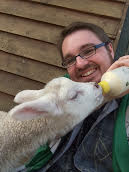As you probably know, we are crowdfunding our community farm in Gower. While we can (and have!) provided plenty of great reasons to contribute, we’re delighted instead to share a piece today written by Richard Gorman, PhD researcher and a director of the UK Community Supported Agriculture Network. We thank him very much for his kind words, and will let him do the talking!

“We need projects like Cae Tan to grow, and inspire similar schemes, in order to further the development of a more socially just, locally based, and sustainable food system.”
As part of my research into different models of local and alternative agriculture projects in the UK, I’ve had the pleasure of following Cae Tan on its journey from a fallow, empty field, to a vibrant community resource in the heart of a beautiful part of the Gower peninsula, feeding over 50 families and working to improve local biodiversity and restore traditional heritage methods of countryside management.
It’s amazing to see the sheer amount of high quality food that just one field, when managed with skill and passion, can produce. Cae Tan’s produce is grown with organic principles, and the bountiful yields produced each week for their members ‘share of the harvest’ is a sight to behold.
Cae Tan is also interesting for its desire to innovate, and develop the model of community supported agriculture further. Traditional applications of CSA usually focus primarily on horticultural production. Some of Cae Tan’s members currently own and manage a flock of over fifty sheep, as well as a large flock of chickens, regularly producing large numbers of eggs for farm members who want to be involved in sharing the responsibility and reward of the farm’s animal endeavours. As well as increasing the farms offer and appeal, the animals also add to the enjoyment that members get from being involved in the community supported agriculture scheme:
“People laugh a lot, you know, when we’re rounding up the sheep hopelessly, like 15 of us trying to round up a field of sheep with loads of kids.”
Often when I talk to people about my work with community supported agriculture, they ask, ‘is it not just a veg-box scheme?’, and Cae Tan is a brilliant example that highlights how much more being involved in a community supported agriculture project can bring. The farm is as much about the social opportunities as it is about food production, farm members often pop along throughout the week to have a chat with Tom and Lizzie, the growers, or lend a hand with whatever tasks need doing.
There’s also a huge focus on the educational opportunities that the farm can provide, and the project actively works with local schools in the area to teach children about food and nature – there’s even a dedicated children’s growing space as part of the farm, which is designed and managed by children and their parents.
Creating opportunities is another large focus at the farm, and this includes engaging hard to reach, and at-need groups, inviting them down to the farm to make use of the therapeutic benefits of being outdoors; having contact with nature, and being involved in a lively, inclusive social atmosphere. It’s really inspiring to see changes that have happened with some of the regular groups who have been visiting the farm, and is another way in which Cae Tan is developing the model of community supported agriculture – the agricultural activity is framed as being there to support the wellbeing of the community, rather than just the other way around.
So much has happened in such a short space of time – community supported agriculture projects are often ‘slow burning’, taking time to set up and stabilise. Cae Tan has hit the ground running, and doesn’t show any signs of stopping. Having already proved their ability to feed 50 households, the farm aims to increase to 100 in the next year. They also have plans to further embrace the educational and outreach activities the farm engages in, working with a larger number of schools and being able to increase their volunteering and visiting group capacity.
Cae Tan is a fantastic implementation of the Community Supported Agriculture (CSA) model, an innovative style of food production where the community shares the responsibilities and rewards of the farms harvest in a spirit of mutual trust and openness. It’s a model that combines satisfying the increasing desire for locally produced food, with a mission to build and embed community resilience, all within the sprit of social sustainability. A model that aims to create personal links between consumers, and the farms and land that their food comes from, whilst making nutritious foods more affordable and accessible to people, and providing educational opportunities about food production and the environment.
It’s an exciting time for community based food production, the interest and demand for locally produced food continues to increase. We need projects like Cae Tan to grow, and inspire similar schemes, in order to further the development of a more socially just, locally based, and sustainable food system.
—
You can support our crowd fund here: https://www.buzzbnk.org/FieldGoodCrowdFarming
—
Rich Gorman is a PhD student in Cardiff University’s School of Planning and Geography, and a Director of the CSA Network UK. Rich’s research examines local and alternative food networks, and the volunteering opportunities associated with these.
















